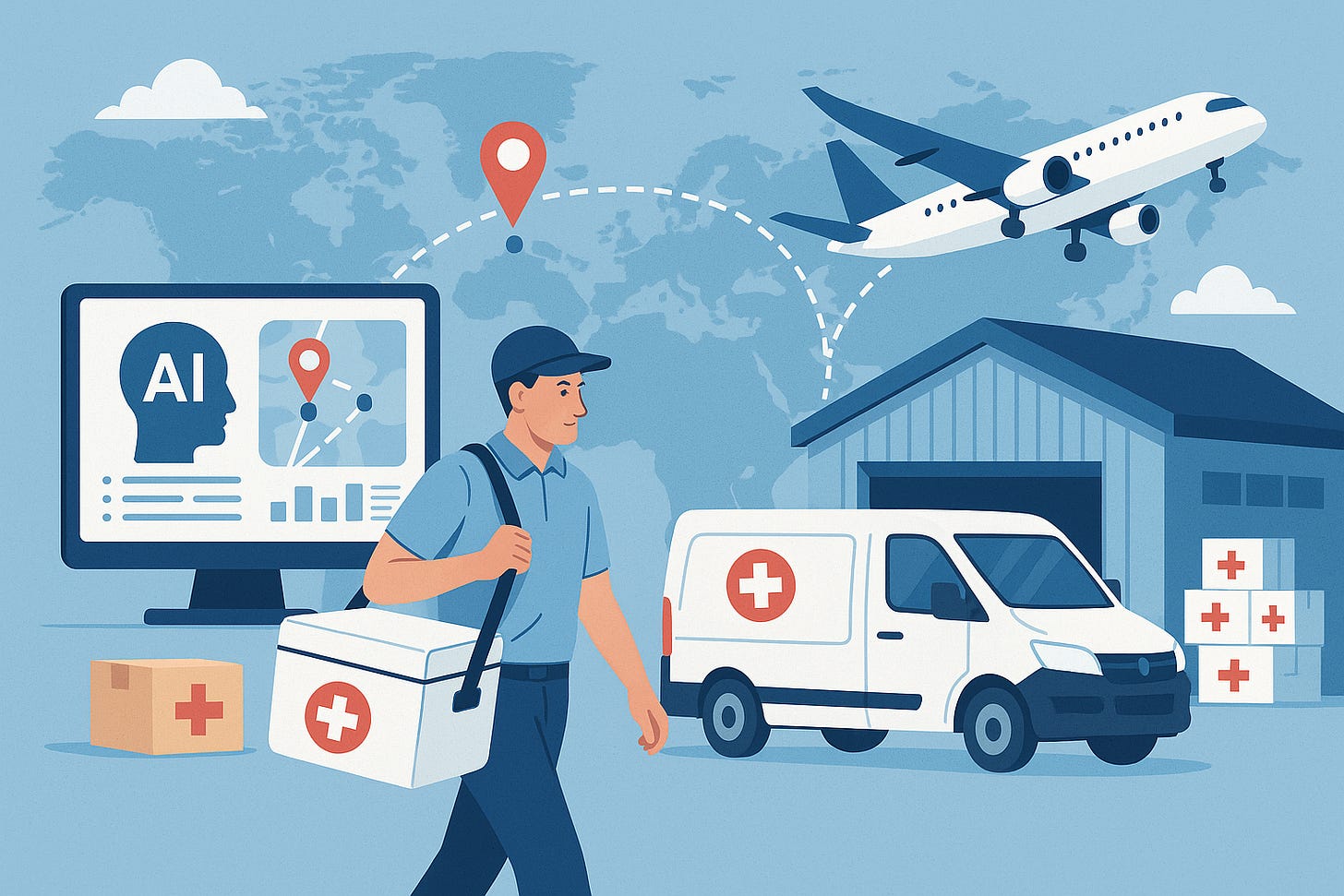How AI-Powered Logistics Platforms Are Transforming Time-Critical Medical Shipments from Regional Hubs
AI Tech Boosting Urgent Medical Delivery Speed
In Kanpur, an emerging hub for pharmaceutical and healthcare distribution, there’s growing demand for precise, time-bound delivery of life-saving medications. Businesses that partner with the Best Medicine Courier Service in Kanpur increasingly depend on cutting-edge tech to meet the rising complexity of global healthcare logistics. As AI-driven platforms evolve, they’re fundamentally reshaping how temperature-sensitive and urgent medical shipments move from regional warehouses to international and domestic destinations.
This article explores how AI and digital optimization are not just improving speed and compliance, but also unlocking entirely new business capabilities for pharma exporters, healthcare suppliers, and logistics managers.
The New Imperative: Tech-Driven Predictability in Healthcare Supply Chains
Healthcare supply chains have always required a higher level of diligence than standard retail or B2B logistics. But post-pandemic, the stakes have escalated. Markets are now shaped by:
More stringent regulatory requirements, particularly for prescription drugs, biologics, and specialty treatments.
Globalized patient needs, with NRIs and international students expecting reliable shipments from India.
Demand for cold chain integrity, especially for insulin, vaccines, and cardiac treatments.
AI platforms integrated by advanced logistics players are tackling these challenges head-on. They process millions of data points to optimize routes, predict customs clearance delays, and even factor in geopolitical events. This drastically reduces the uncertainty traditionally associated with international and long-haul domestic shipments.
Companies leveraging these solutions—often in partnership with trusted providers like the Best Medicine Courier Service in Kanpur—are able to guarantee not just quicker deliveries, but a predictable delivery experience, which is critical for patients managing chronic conditions.
Machine Learning Optimizes Everything from Packaging to Last-Mile Routes
One area where AI is making a profound impact is packaging and handling. Predictive models trained on historical spoilage and breach data help logistics providers determine:
The ideal insulation and coolant combinations for specific climatic transit corridors.
Real-time adjustments, where machine learning systems flag risks and reroute consignments to mitigate potential temperature excursions.
At the same time, AI-driven dynamic routing goes far beyond GPS-based shortest-path logic. These systems factor in hyperlocal congestion data, weather forecasts, and even airport-specific cargo backlogs. As a result, shipments of high-value biologics or hypertension medications can be automatically diverted to alternative flights or trucking networks to maintain promised delivery windows.
This shift from static planning to continuous AI-driven optimization is a strategic win for exporters, pharmaceutical distributors, and healthcare providers dependent on consistent service from regional hubs like Kanpur.
Blockchain and Digital Compliance: Securing Critical Shipments at Every Stage
Another critical frontier is secure digital tracking. For many Kanpur-based pharma exporters, maintaining auditable proof that shipments remained within regulatory compliance throughout transit is essential—not just for Indian authorities but also to meet stringent EU, US, and Gulf standards.
Blockchain-backed shipment records are increasingly integrated into modern logistics ecosystems. These immutable ledgers store:
Temperature logs from IoT sensors inside packaging.
Chain-of-custody handoffs at airports, trucking hubs, and customs checkpoints.
Automated compliance validations aligned with destination country laws.
Such transparent documentation reduces legal exposure for distributors and builds trust with overseas hospitals and pharmacies. When combined with AI prediction tools, this end-to-end visibility transforms what was once a risky black-box process into a rigorously documented supply chain.
It’s telling that some of the most sophisticated players in India now require their partners—including the Best Medicine Courier Service in Kanpur—to integrate these blockchain and digital quality systems as standard practice.
Looking Forward: How SMEs and Regional Exporters Can Stay Competitive
A few years ago, these advanced tech solutions were largely the preserve of multinational pharmaceutical giants. Today, they are accessible to SMEs, regional third-party logistics firms, and even local medicine aggregators operating from cities like Kanpur.
Cloud-based AI platforms are designed to be modular. Smaller players can:
Adopt predictive route optimization tools without overhauling their legacy ERP systems.
Use digital twins to simulate complex shipping scenarios before real-world execution, ensuring regulatory and temperature compliance.
Leverage shared blockchain networks, avoiding the heavy infrastructure costs of building proprietary compliance ledgers.
For Kanpur’s growing ecosystem of pharmaceutical wholesalers and medicine exporters, this means the barriers to offering world-class, tech-enhanced shipping solutions are lower than ever.
The result? Even modest regional operators can now compete credibly with global players on factors like on-time delivery, audit-ready compliance, and patient-centric reliability. It’s a technological democratization that levels the playing field and ultimately benefits patients across continents.
Conclusion
Just a decade ago, digital transformation in medicine logistics was viewed as a differentiator—a smart edge for companies chasing growth. Today, it’s a baseline requirement. Whether it’s ensuring temperature stability for biologics, complying with multi-jurisdictional customs laws, or simply guaranteeing patients abroad receive their hypertension tablets on time, technology has moved from helpful to mission-critical.
Businesses working with regional leaders like the Best Medicine Courier Service in Kanpur are finding that embracing AI, blockchain, and IoT is no longer a futuristic strategy. It’s the only reliable way to protect patients, satisfy regulators, and thrive in a hyper-connected global marketplace.
As more SMEs and local logistics providers in Kanpur integrate these innovations, the city’s role as a secure, tech-forward hub for critical medicine distribution is only set to grow—delivering not just products, but peace of mind, across borders.



